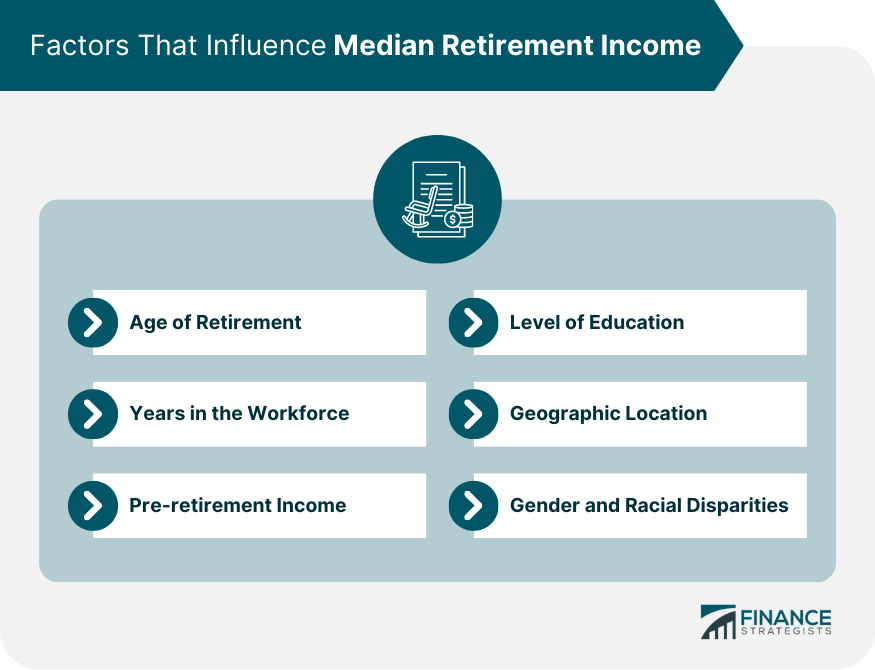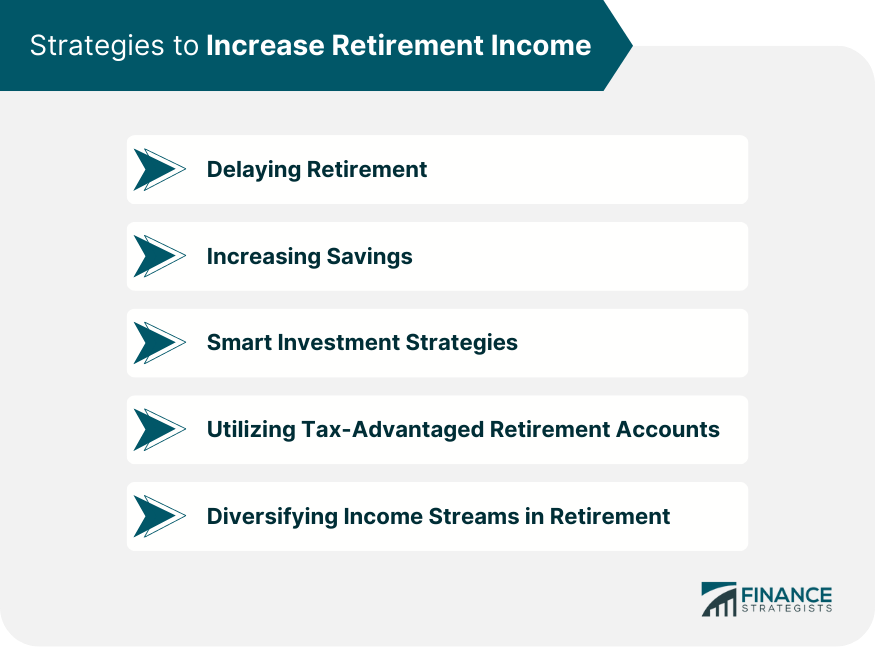Median retirement income refers to the midpoint income received by retirees, meaning that half of all retirees have income above this value and the other half below it. Understanding this concept is vital for anyone planning for retirement as it provides an idea of the typical income one might expect during retirement years. It gives context and a reference point to evaluate personal retirement plans and goals. As of 2023, the median retirement income for U.S. households aged 65 and older was approximately less than $52,575. However, this figure varies widely based on various factors, including geographic location, education level, pre-retirement income, and more. Recognizing the median retirement income can impact readers by encouraging proactive financial planning to secure a comfortable retirement. The age at which an individual retires directly affects their retirement income. Those who retire early may have less retirement income due to a shorter period of contributions to retirement plans and pensions. The length of time a person has worked also influences retirement income. Individuals with more years in the workforce tend to have higher retirement income as they have had more time to contribute to retirement funds and accrue savings. High earners tend to have higher retirement incomes as they are often able to save more during their working years and contribute more to retirement plans. Education influences earning potential during working years and, thus, affects retirement income. Individuals with higher education often have higher earnings, leading to higher retirement income. The cost of living and wage standards in various locations can impact retirement income. Individuals in high-cost-of-living areas may need a higher retirement income to sustain their lifestyle. Unfortunately, systemic gender and racial disparities in earnings often carry into retirement. Women and people of color tend to have lower retirement incomes due to these disparities. Retirement income comes from various sources, including Social Security benefits, pensions, retirement savings accounts like 401(k)s and IRAs, annuities and insurance contracts, investments and dividends, and part-time work during retirement. In the U.S., Social Security is a significant source of retirement income for many people. The Social Security Administration provides monthly payments to retirees based on their past earnings. Pensions, although less common today, provide regular payments to retirees based on their years of service and final salary. Individual retirement accounts (IRAs) and 401(k) plans allow individuals to save for retirement with tax advantages. Annuities provide a steady income for a specified period or for life, offering a reliable income stream for retirees. Investments in stocks, bonds, and real estate can provide income through dividends, interest, and rent. Some retirees choose to work part-time to supplement their retirement income and stay active and engaged. Inflation has a profound effect on the real worth of retirement income. As it gradually reduces the purchasing power of money, the same sum of retirement income will afford less in the future due to increasing prices. Hence, considering inflation in retirement planning is critical. It is necessary to adjust retirement income in relation to inflation rates to uphold its value and ensure it sustains the retiree's purchasing power, thereby maintaining their standard of living. There are various strategies to increase retirement income, including delaying retirement, increasing savings, smart investment strategies, utilizing tax-advantaged retirement accounts, and diversifying income streams in retirement. Working a few extra years can significantly increase retirement income. It allows more time for contributions to retirement savings and reduces the number of years retirement savings need to last. The more an individual can save during their working years, the higher their retirement income will be. It's recommended to start saving early and consistently over time. Investing in a diversified portfolio can increase retirement income. It's essential to balance risk and return and consider professional advice if necessary. Making the most of tax-advantaged retirement accounts, such as 401(k)s and IRAs, can significantly boost retirement income. Having multiple income sources in retirement can provide a safety net. These could include Social Security, pensions, savings, investments, and part-time work. Understanding the concept of median retirement income is crucial to preparing for a secure and comfortable retirement. This figure, affected by factors such as the age of retirement, years in the workforce, pre-retirement income, education level, geographic location, and systemic disparities, provides a helpful benchmark for financial planning. A retiree's income can come from varied sources, including Social Security, pensions, savings accounts, annuities, investments, and even part-time work. Being mindful of inflation's impact and deploying strategies such as delaying retirement, increasing savings, wise investments, and diversification of income sources can elevate retirement income levels. Proactive planning is key to ensuring financial security and the ability to cover expenses in retirement, reducing reliance solely on Social Security. Ultimately, understanding and navigating these elements are instrumental to achieving a financially sound and fulfilling retirement.What Is the Median Retirement Income?
Have questions about retirement planning? Click here.Factors That Influence Median Retirement Income
Age of Retirement
Years in the Workforce
Pre-retirement Income
Level of Education
Geographic Location
Gender and Racial Disparities

Sources of Retirement Income
Social Security Benefits
Pensions
Retirement Savings Accounts
Annuities and Insurance Contracts
Investments and Dividends
Part-Time Work During Retirement
Influence of Inflation on Retirement Income
Strategies to Increase Retirement Income
Delaying Retirement
Increasing Savings
Smart Investment Strategies
Utilizing Tax-Advantaged Retirement Accounts
Diversifying Income Streams in Retirement

Conclusion
What Is the Median Retirement Income? FAQs
The median retirement income in the U.S. refers to the midpoint income that retirees receive, with half of all retirees having income above this value and half having income below it.
The median retirement income is the midpoint income of retirees. It's determined by ordering all retirees' incomes from the lowest to the highest, with the median being the middle value. This means that half of retirees will have an income above this value and the other half below.
Key factors that influence median retirement income include the age of retirement, years in the workforce, pre-retirement income, level of education, geographic location, and gender and racial disparities.
Several strategies can help increase retirement income above the median. These include delaying retirement, increasing savings, investing wisely, utilizing tax-advantaged retirement accounts, and diversifying income streams during retirement.
Understanding the median retirement income is crucial as it provides a benchmark to gauge where one might stand compared to others in retirement. It also helps individuals set realistic retirement goals and strategize their savings, investments, and other income sources more effectively.
True Tamplin is a published author, public speaker, CEO of UpDigital, and founder of Finance Strategists.
True is a Certified Educator in Personal Finance (CEPF®), author of The Handy Financial Ratios Guide, a member of the Society for Advancing Business Editing and Writing, contributes to his financial education site, Finance Strategists, and has spoken to various financial communities such as the CFA Institute, as well as university students like his Alma mater, Biola University, where he received a bachelor of science in business and data analytics.
To learn more about True, visit his personal website or view his author profiles on Amazon, Nasdaq and Forbes.













